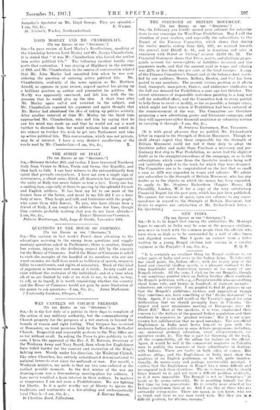NEW INDIA.
[To THE. EDITO7 ae THE " SPECTATO,"3
SIR,—It is to be hoped that [mom; the authorities Mr. Armitage hopes to consult in India may be some of the younger civil inns, men more in touch with the common people than the offieials who have risen so high as to be surrounded by a with of office boxes and dignified reserve. May I quote an extract from n letter written by a young Bengal civilian now serving in a cavalry
regiment in the Purtjall2-1 rim, Sir, tie., P. Q. R.
" It is certainly an excellent thing for Bengal civilians to sea other parts of India and serve in the Indian Army. To take sully one small point, the.Indian offieo,, with his hearty grip of the hand and cheerful elmffing ep.‘ech, is a pleasant cold east to the limp handshake and deprecating rummer of too many of our Bengali friends. All the same, I stick up for our Bengalis, though I HID-sometimes 17114Zieti when an Indian brother officer contrasts the Bmigali politician with, e.g., a Punjabi notable wlm says nothing about home rule, and brings in hundreds of stalwart recruits-- volunteers not consonipts. I am puzzled to find fit phrases to say that the Bengali's ambitions, reckless and unpractical though they sometimes are, have something of the' divine discontent them. Again, it is an odd result of the Viceroy's append for calla deliberation that we should promptly have in Calcutta 'the largest and most unanimous meeting of Europeans since the Ilbert Bill.' Most of the speakers. it is trite, emphnsised their concern for the welfare of the general Indian population and their readiness to acquiesce in ' gradual reforms.' But it is not acqui- escence but collaboration that we need nowadays. The noo-officiel Englishman in India must bestir himself to juin with the moderate Indian politician in some definite programme, including, say, universal primary education, rend self-government. co- operative credit, Sr. The day is past for throwing all the work, all the tresponsibility, all the odium for failure on the official. Again, it would be well if the commercial' magnates in Calcutta were to mollify the manners of their eubordinall, in dealings with Indians. There are faults on built -ides, of course. But noblesse oblige, and the EngliAnnut in India must show the qualities of all English. gentleman, or he will. quite uninten- tionally, do unnecessary and perhaps irretrievable mischief. confess that the Englishman in Bengal has a more difficult and or:congenial task than elsewhere. The in ,re roasoa why he should brace himself to it, and not treat a diffienit problem recklessly. se if it were impossible. The Bengali is not so ' bumptious' at heart as Inc seems outwardly. He is asserting himself for the first time for long generations. He is secretly more afrnid of Iris Indian countrymen than of us: And I say this of those who nra outwardly irresponsive. There are many. as you know, who are as frank and loyal as any man could wish. But they are in a difficult position, for obvious reasons."






































 Previous page
Previous page